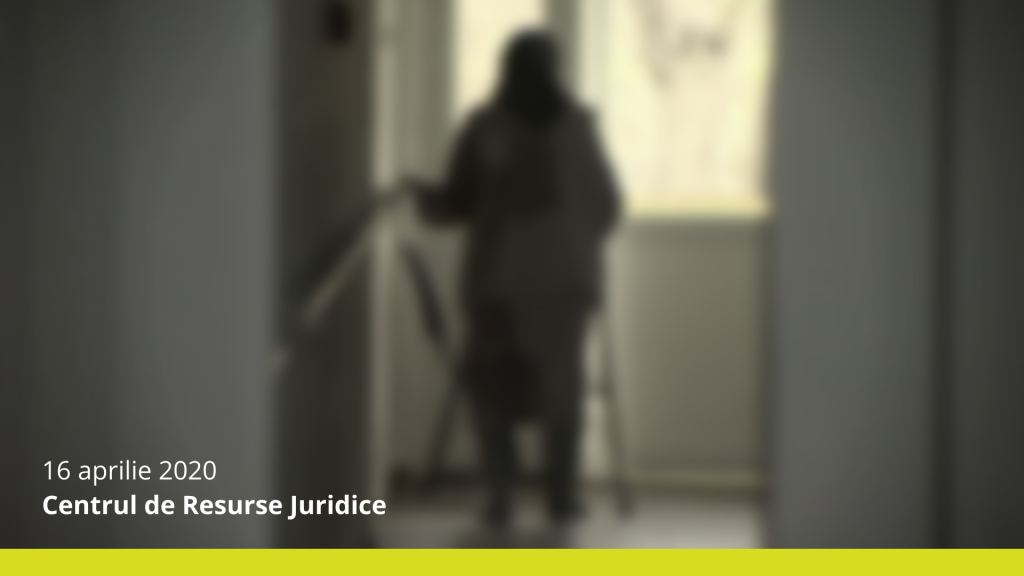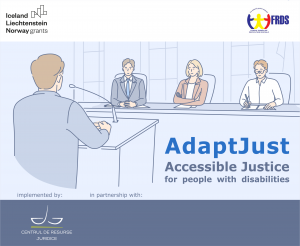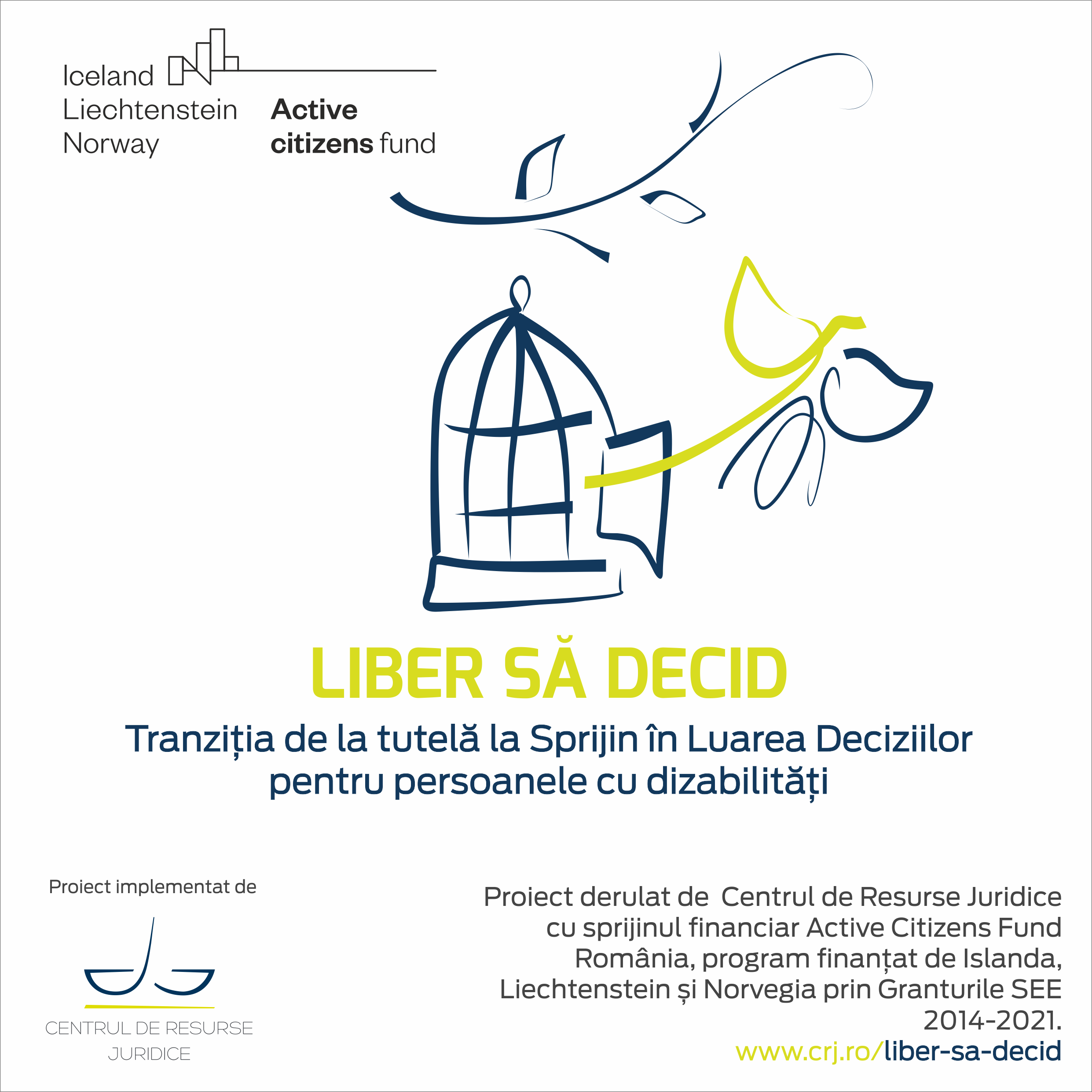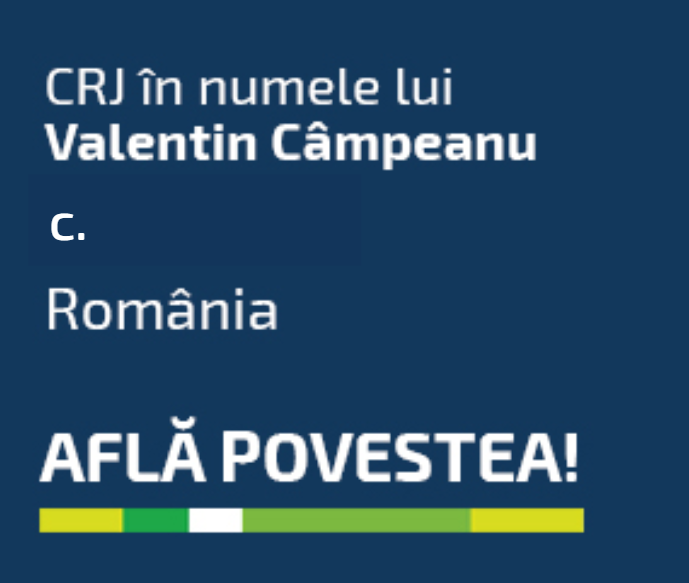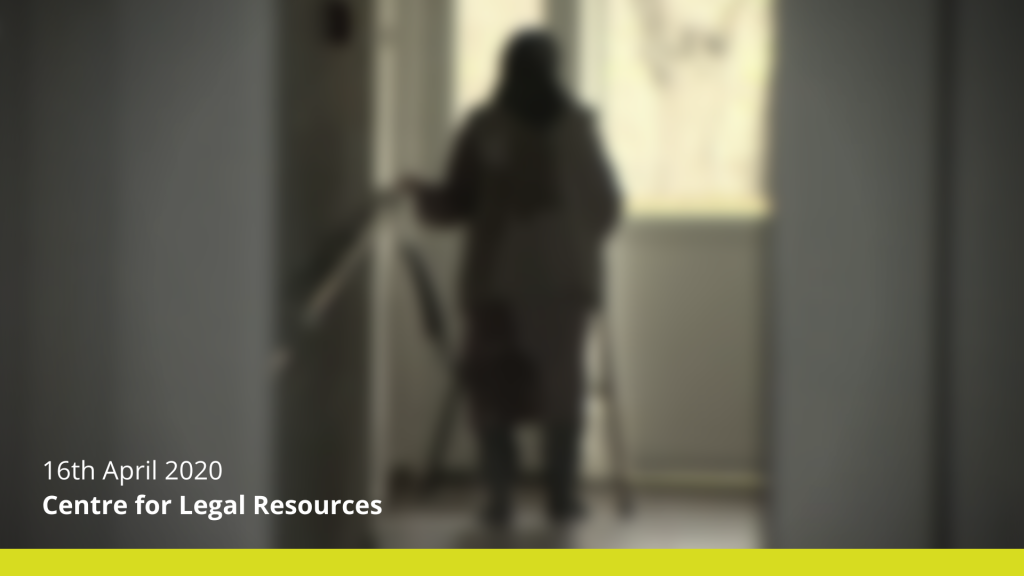
In the last two weeks, the Centre for Legal Resources has contacted approx. 100 nursing homes and social care homes throughout in the country with the aim of documenting and assessing the needs and challenges faced by the social assistance system in the context of the Covid-19 pandemic. The following assessments and recommendations are formulated based on discussions with employees of the nursing homes and social care homes for persons with disabilities, on the evolution and characteristics of confirmed cases of infection in these institutions (as communicated by the authorities and the press), and on the legal provisions of Military Ordinance No. 8/2020.
At the moment, in Romania there are several COVID-19 outbreaks in nursing homes for the elderly and in a family-type home for children with disabilities. The lack of early testing of those exposed[i], the lack of protective supplies available to staff and the inefficiency of prevention measures[ii] imposed until April 9th have led to approximately 130 cases of Covid-19 infection among residents of nursing homes for the elderly, social care homes for persons with disabilities and other vulnerable categories.
On April 9th 2020, the Romanian government issued Military Ordinance no. 8 regarding the measures for the prevention of the spread of COVID-19, which provides, among other measures, in Article 10 (1), that staff in social care centers shall be isolated at work for periods of 14 days, alternated by two weeks in preventive isolation at home.
CLR considers this measure to be efficient in terms of protecting the residents and employees of nursing and social care homes from the pandemic. Residents are the most vulnerable to the new coronavirus. The death rate among them is much higher than among the general population, so more restrictive measures are required in order to limit the danger. Every day, other countries with better prepared social care systems report numerous COVID-19 cases and deaths in nursing homes for the elderly, in medical-social centers and social care homes for people with disabilities[iii]. The situation is aggravated by the fact that most nursing and social care homes have at their disposal only some of the protective equipment necessary to prevent the spread of COVID-19, their stocks being deficient or completely lacking in terms of disinfectants (for surfaces or for hands), protective masks, gloves, or disposable robes. Furthermore, the preventive measures previous to Military Ordinance No. 8/2020 have proved their limits. Recent situations in Galați and Orăștie, as well as those that will unfortunately still occur in the upcoming days indicate the inefficiency of these measures.
In this context, the decision of some nursing and social care homes in Romania that already resorted two weeks ago to the measure of isolation in the workplace is worthy of appreciation. They did so out of a good understanding of the danger, but also of the purpose of social services. At the same time, several nursing and social care homes in the country had started to voluntarily apply preliminary isolation measures, which is proof that they have themselves identified these measures as having an increased efficiency (preparing spaces for isolating staff; accommodating commuter staff within the nursing home for three to five days; minimization of staff rotations by changing shifts).
The measure of isolating staff at work in nursing and social care homes is certainly difficult for employees. They are included in the list of professions which are required to operate according to a different work scenario during the state of emergency. Therefore, CLR considers that this sacrifice required of employees should be compensated: those who will be accommodated and isolated directly in nursing and social care homes will spend practically hundreds of hours at work, sometimes in environments with high levels of stress from which they will not be able to disconnect. Nursing and social care homes employees could benefit, as in the case of doctors and other actors in the front-line system, from an additional financial motivation associated with the degree of risk that their role currently entails. Such incentives would also have the role of retaining current staff, but also of attracting new employees for the positions that can now be occupied without competition.
Solutions on how to manage the implementation of Article 10 (1) of the Military Ordinance no. 8/2020, decisions on the organization of staff isolation, the organization of the programme of employees who are unable to isolate, as well as the activities of residents, remain within the reach of the management of nursing and social care homes, as well as local public authorities. To this end, in accordance with Article 11[iv] of the Ordinance, where it is not possible to isolate staff in the social care home, local public administration authorities shall be required to identify and ensure, in their vicinity, spaces for the accommodation of employees in workplace isolation, the daily food necessary for them and the provision of transport.
Another necessary measure to prevent Covid-19 from spreading in nursing and social care homes is the obligation to test all staff and residents, in the case of centers for which there is any suspicion of contact with infected persons or in the presence of specific symptomatology (Article 14 (1) of the Military Ordinance). In addition, in accordance with Article 12, staff will be provided with the necessary hygienic and protective equipment. CLR has contacted nearly 100 residential institutions in the country in the past two weeks, mainly nursing homes for the elderly. Following the discussions with the staff of these centers, it became apparent that the majority of the centers contacted had at their disposal, at the time of the discussions, only some of the protective equipment necessary to prevent COVID-19 from spreading, their stocks being deficient or completely lacking. Some nursing homes managers had obtained some of the necessary materials from donations, had placed orders, reported on the necessary equipment (currently waiting for them to be delivered), or filled in the lists of equipment and materials supplied by the City Hall or the Ministry of Labor. In some centers, the necessary materials were estimated to be enough for another week or two. Other nursing and social care homes have resorted to making fabric masks and disinfecting them daily in the absence of medical masks.
Last but not least, CLR also points out that, from discussions with the staff of the centers contacted, a potentially high risk situation is the lack of harmonization of inter-institutional procedures on transfer and admissions. Residents discharged from hospitals return to nursing or social care homes without being tested, as happened in Orăștie. Such procedures can defeat prevention efforts carried out at the level of the social assistance system. In Orăștie, the nursing home became an outbreak point and more than 20 residents and 5 employees were reported with COVID-19 in the first official briefings. In another case identified by CLR, concerning an elderly person with chronic respiratory failure (resident of a nursing home in Bacău county), the hospital insisted on discharging the patient back into the care of the nursing home without the patient having been tested for COVID-19. The person was tested by the Public Health Directorate (the result being negative) only after the management of the nursing home had made numerous requests in this respect, and was subsequently transferred back to the center.
Therefore, in order to further reduce the risk of COVID-19 infections in nursing and social care homes throughout Romania, CLR:
- Calls for the issuance of harmonized, clear and mutually agreed upon procedures between the Ministry of Health and the Ministry of Labor and Social Justice regarding the transfer of residents and patients between institutions, a procedure that will not encumber prevention efforts carried out at the level of the social assistance system.
- Requests Public Health Directorates, County Councils and the Government, to treat with responsibility the issue of providing necessary protective equipment to nursing and social care homes, in accordance with the provisions of Article 12 of Military Ordinance No. 8/2020.
- Requests local public administration authorities to identify and ensure solutions with regard to the accommodation and transport of employees of nursing and social care homes where they do not have their own accommodation resources, for the optimal application of the provisions of Articles 10 and 11 of Military Ordinance No. 8/2020.
The Centre for Legal Resources continues discussions with nursing and social care homes throughout the country in the near future.
To provide us with information about the situations you face in residential centers in the country, you may contact us at 0728 112 187 / office@crj.ro .
________________________________________________
[i] See the case in Orăștie, where a resident was discharged from the hospital without being tested, which led to the contamination of the social care home for the elderly where he lived.
[ii] In Bucharest, despite the preventive measures applied, a private center for children with disabilities was contaminated by the nurse who was using public transport.
[iii] www.nbcnewyork.com/news/local/death-toll-climbs-inside-group-homes-for-the-developmentally-delayed/2369425/?_osource=db_npd_nbc_wnbc_twt_shr
[iv] “In case social service providers do not have their own accommodation resources for the application of the provisions of art. 10 paragraph (2), the local public administration authorities […] have the obligation to identify and provide, in their proximity, spaces for the accommodation of personnel isolated at work, their necessary daily food, as well as to provide transport for those who are in preventive isolation at home, from their workplace to their home and vice versa, in compliance with the measures for protection and prevention against the infection. “
_________________
UPDATE: On 21 April, more than 300 persons – 242 patients and 59 employees – from the Sasca Mică Neuropsychiatric Recovery Center in Suceava County were confirmed with coronavirus (link), while 18 former residents of the „St. Ilie ” nursing home in Galați died due to COVID-19 (link).
At another nursing home in Răcari, tests confirmed that 30 residents and 9 employees have the coronavirus (link).

